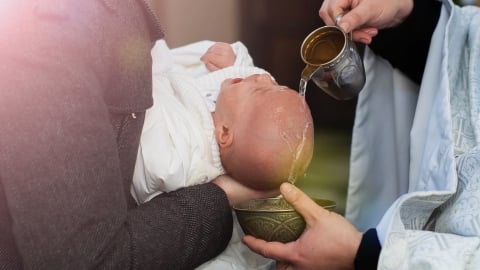Feminine Beauty and Modesty: Part 1

This is the first part of a two-part sermon given by Fr. Louis Pieronne, SSPX. The specific theme of this part is beauty and modesty.
Man’s Misery
In speaking of modesty, our imperfect words can sometimes lead to misunderstanding. It is a given that sin comes from the heart of man and not from the body of woman. It is the heart which is wounded by original sin and subject to concupiscence. The feminine body is a work of God, a marvel whose great dignity is to be the temple of life. It is the place we were all conceived and carried. It is the place we all received life. We can never have enough respect for the body of woman, where so great a mystery occurs. It is not this body which is tainted but the reaction of which it can be the object and the occasion.
Why then do we ask woman for modesty? If this body is good, why would she hide it? Why give her the false impression of being a source of corruption, accusing her of tainting others? To understand the situation of fallen nature and its demands, we must consider the plan of God.
The Plan of God
God sows reflections of His own perfections throughout His work, sharing out among His creatures all the qualities that in some way reveal His majesty. There is one quality which man has never disputed with woman – inclined though he be to flaunt his superiority in every domain – and that quality is beauty. God gave beauty to woman as her prerogative, and because beauty is made to be contemplated, it was at the same time a gift to man. This beauty was God’s final touch to the harmony of creation, bringing it to perfection.
The world was already beautiful, but its beauty was entirely material and impersonal. Henceforth, beauty is contemplated in a person, and that beauty is a mix of material and spiritual, a delightful blend of qualities of body and heart which we call femininity. Adam’s marveling before Eve shows how necessary that beauty was, as well as its power over the heart of man to complete him and elevate him. Eve was for Adam the most beautiful reflection of God’s own beauty and goodness. In his original innocence, Adam contemplated in perfect purity this woman come from the hands of God, and Eve herself was transported with joy at being the object of that admiration full of love.

Further Reading on the Topic:
The Nature, Dignity, and Mission of Woman
Fr. Stehlin, a priest with over 25 years of pastoral experience, takes up his pen to examine, explain, and defend real femininity. This book, the fruit of a series of talks given to young ladies at a Catholic boarding school, will help all Catholics, but especially the young, rediscover the immense dignity of being a woman, as lived out in accord with the plan of God's creation.
The Radiance of Beauty Broken by the Fall
With sin, disorder came into the world and into man himself. After man’s act of disobedience, instinct ceased to be subject to the soul which had ceased to be subject to God. Innocence was lost. God had provided Adam with this instinct in commanding him to increase and multiply, but desire in him was then entirely obedient: Adam would have had to resolve to transmit life, in consideration of God’s commandment, and desire would have followed on that choice of his reason. If humankind had developed in this way, with the gift of original integrity in that state of innocence, instinct would never have been able to manifest itself outside the framework of conjugal virtue. Never would desire have drawn man toward any woman but his spouse. Never would it have drawn him toward his spouse without having first been set in motion by reason and love.
Immediately after the Fall, however, the two saw that they were naked – that is, Eve felt weighing on her that gaze of disordered concupiscence. Adam, who had once been fascinated by a beauty which elevated him, suddenly found himself obsessed by the sight of a body which aroused his desire. He no longer had mastery of his own body and was obliged to cover his shame with leaves that hid the disordered movements which he could no longer impede. Just as we no longer master the fact of salivating when someone speaks to us of a savory meal, man is now hostage to his own instinct before the body of woman. He can only turn his will away from what is happening in him. He can no longer even appreciate beauty because passion blinds his reason and only leaves room for desire. Adam, remembering his innocence, was full of confusion and found himself obliged shamefully to turn his eyes from the one whom he had once contemplated. Eve herself hid from this gaze under which she felt herself reduced to an object.
Beauty in the Plan of Redemption
Was man to be forever deprived of beauty? Was woman to be reduced merely to awakening the lower instincts? Would God leave humanity deprived of the capacity to contemplate this reflection which He had confided to us? In His mercy, the Lord did not allow that irreparable disaster. As Scripture tells us, “God gave them garments…”
Yes, God created clothing (and not the loincloth which merely serves to hide man’s shame) in order to save femininity and give the treasure of beauty back to man and woman. For when Adam saw Eve clothed in that first dress, something which he had never seen before, he found her delightful (everything which God makes is beautiful). And he realized that this modest garment hid the body sufficiently for instinct not to be awakened, but left room for the elegance and beauty which he so needed. And Eve, finding again in Adam’s eyes that respectful gaze, was proud of this garment which gave her back her dignity and her capacity to offer a beauty which elevates. From that moment on, the modest adornment of clothing became the inseparable companion, the necessary instrument, of the radiance of femininity. Clothing allows woman to carry out her duty of beauty for wounded man and become once again the reflection of divine beauty.
Yes, beauty remains a natural mission of woman, inscribed in the depths of her being, and ever since original sin this beauty must be redemptive.
Yet did not sin bring ugliness and deformity into the world? Has not the body often lost its beauty? What then is to be done, if beauty is indeed a duty? We said that feminine beauty is a blend of material and spiritual, of qualities of body and heart. The beauty of the heart can be restored by the surgery of grace, which has the added advantage of being free of cost. Femininity is always beautiful, and women are mistaken when they imagine that the body alone is what counts. For a child, his mama is always the most beautiful of mothers, whatever the measurement of her waist or the length of her nose. All around us there are women who would never be hired by Hollywood and yet who are tenderly loved and admired. There again, clothing becomes an ally of femininity for the recovery of an elegance which nature refused and for the reflection of qualities of the heart. A neat and tasteful presentation achieves more than a great quantity of make-up. Men are much more sensitive to elegance than women suppose; it renders them more attentive and thoughtful.

Further Reading on the Topic:
The Art of Parenting
"Our task is to form the children entrusted to us. The goal is strong children; strong in the soul, strong in mind, strong in heart—Christ-like. Children who are upright, faithful, sure-in-judgement, responsible-in-duty, and great in heart."
—Fr. Beck in "The Art of Parenting"
The Grace of Modesty
Modesty is therefore not simply a constraint required by man’s misery. Even less is it a disdainful rejection of the feminine body. Rather, it is the only means, blessed and given by God, to preserve not only respect for woman’s body, but also the radiance of woman’s beauty.
A man who is chaste will suffer immodesty as an aggression, come to arouse his instinct, and he will flee with disdain one who appears to him a seductress. On the contrary, he will feel protected and nobly attracted by the radiance of modesty. The sensual man puts a depraved pride in the movements of his virility and will seek after excitation by ogling at corporal beauty. But his carnal gaze is only an instinct of conquest which can go no farther than pleasure. His blinded gaze is incapable of penetrating deeper, to the riches of femininity, and it will take a long, hard effort for a woman who seduced through her body to make a man realize that she is more than just an object…
Without modesty, man cannot reeducate his gaze. It is modesty which works this reeducation, freeing it from the blindness of sensuality and allowing it to rediscover beauty.
A Naturalistic Illusion
Some might claim that an education to beauty is able to repair that wounded gaze. Yet the history of art does not seem to confirm this theory. Who better than an artist would be apt to see the harmony of forms before all else? From all time, painters have been in quest of perfect feminine beauty. Yet most of them ended as the lovers of their model, the desire of the flesh following on the admiration of beauty. Instead of art saving beauty, what has more often occurred is the enslavement of art to passion: beauty placed in the service of seduction.
Religious art – which has sometimes suffered from this same evil, unfortunately, in periods of excessive humanism, forgetting the gravity of the Fall – has nonetheless managed to immortalize feminine beauty in all its modesty, especially through that trove of images in which artists have striven to portray the immaculate beauty of the new Eve, “glorious from within.” How many souls have been upheld by the smile of these statues of the Blessed Virgin, sometimes naive in their traits but always majestic?
We therefore dare to say in the name of all men, “Be beautiful and raise our hearts above the baseness of those instincts against which we struggle with such difficulty! We do not want to see you as an object but to admire you! When God drew Eve from Adam’s side, He said, ‘Let Us make unto him a helpmate like himself.’ Help us to honor you as you deserve! Be for us redemptrix, and not temptress! The beauty of your modesty will be the path of salvation for us.”

Read Part 2 of this Series
Feminine Beauty and Modesty: Part 2
The specific theme of this second part is beauty and adoration...
Fr. Louis Pieronne, SSPX - sspx.org - 12/15/23





